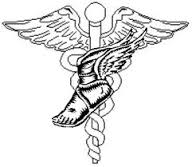understanding laser therapy for pain management understanding laser therapy for pain management
understanding laser therapy for pain management understanding laser therapy for pain management
Phone: (732) 780-8787 understanding laser therapy for pain management understanding laser therapy for pain management
MARLBORO PODIATRY CENTER LLC
PHYSICIANS OF THE FOOT & ANKLE
Corns & Calluses
Corns and calluses are areas of thickened skin that develop to protect that area from irritation. They occur when something rubs against the foot repeatedly or causes excess pressure against part of the foot. The term callus commonly is used if the thickening of skin occurs on the bottom of the foot, and if thickening occurs on the top of the foot (or toe), it's called a corn. However, the location of the thickened skin is less important than the pattern of thickening: flat, widespread skin thickening indicates a callus, and skin lesions that are thicker or deeper indicate a corn.
Corns and calluses are not contagious but may become painful if they get too thick. In people with diabetes or decreased circulation, they can lead to more serious foot problems.
Corns often occur where a toe rubs against the interior of a shoe. Excessive pressure at the balls of the feet—common in women who regularly wear high heels—may cause calluses to develop on the balls of the feet.
People with certain deformities of the foot, such as hammertoes, are prone to corns and calluses.
Corns and calluses typically have a rough, dull appearance. They may be raised or rounded, and they can be hard to differentiate from warts. Corns or calluses sometimes cause pain.
Mild corns and calluses may not require treatment. If the corn or callus isn't bothering you, it can probably be left alone. It's a good idea, though, to investigate possible causes of the corn or callus. If your footwear is contributing to the development of a corn or callus, it's time to look for other shoes.
Over-the-counter treatments can do more harm than good, especially if you have any medical conditions such as diabetes. Some over-the-counter treatments contain harsh chemicals, which can lead to burns or even foot ulcers.
If corns or calluses are causing pain and discomfort or inhibiting your daily life in any way, see a podiatrist. Also, people with diabetes, poor circulation, or other serious illnesses should have their feet checked.

